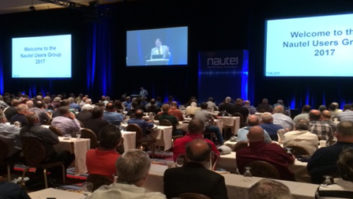WASHINGTON — Since the FCC began enforcing the current contest rule in 1976, broadcasters have complained about a requirement to announce all the rules of a contest on the air. They say the practice drives listeners away and is an inefficient use of air time.
Entercom Communications in 2012 filed a Petition for Rulemaking on changing the contest notification rules. The FCC asked for comment and received no opposition.
The agency took note and late last year it proposed modernizing the rules to keep up with how the audience expects to get its information. Essentially, the commission proposed giving broadcasters a choice of meeting their contest rule disclosure obligation by posting contest rules on a website or by continuing to provide those on-air. Among other things, they would be required to announce the website address where contest information can be found each time they mention a contest on-air.
The window to file comments on the Notice of Proposed Rulemaking (Docket 14-226) recently closed. Sixteen entities filed but they represent a far greater number of stations and organizations; all support the proposal to modernize the contest rules. Media giant iHeartMedia noted that this is unusual. It told the commission that filers in FCC proceedings are “rarely unanimous in their support for (or opposition to) a particular proposal.”
One person wondered what the agency intends to do about stations that have no ready access to the Internet, but this filer, who filed anonymously, still supports modernizing the rule.
Here are excerpts capturing major themes on this issue:
WHY CHANGE IS NEEDED
Filed by the Coalition for Modernization of the FCC Contest Rule. Members are Block Communications Inc., Cordillera Communications Inc., Cox Media Group lnc., Digity LLC, Granite Broadcasting Corp.; and Meredith Corp.
The home page for Cox Radio’s KSMG(FM), San Antonio, Texas, has a “Contest” link on the website.
(Click to see more)
Digity’s WIRK(FM), West Palm Beach, Fla., has both a “Contest” link and an “App Contest” link on its home page.
(Click to see more)
Together, the coalition’s members own or operate 62 television stations and 169 radio stations in markets ranging from Boston, Mass., to Mason City, Iowa to Santa Barbara, Calif. Collectively, those stations conduct hundreds, if not thousands, of contests each year and frequently invite their viewers and listeners to enter promotions online or to go to station websites for more information.


Contest terms are often broadcast while viewers and listeners are involved in various other activities, such as cooking, driving or working. Accordingly, the collective experience of the coalition members supports the notion that viewers and listeners can miss or fail to understand all material terms announced over-the-air during contest promotions because they are distracted by other tasks, increasing the possibility of confusion and failed expectations and making some less likely to enter a contest. Broadcasters can supplement on-air contest announcements with online postings of material terms, but doing so does not meet the requirements of the Contest Rule, so many broadcasters do not post their contest terms online.
By allowing broadcasters to post contest terms online, both broadcasters and consumers will be served. Consumers will benefit because they will be able to review contest terms at any time and in a manner that permits greater comprehension. The costs to broadcasters of placing contest terms online will be negligible, since most stations already operate their own websites, and stations will devote less air time running strings of contest terms over the air. A better understanding of station contest terms will also benefit commission staff, as wider access to contest terms online should reduce consumer confusion which, in turn, should reduce the number of consumer complaints.
ONLINE DISCLOSURE MAKES RULE MORE EFFECTIVE
iHeartMedia:
Written online material term disclosures would allow consumers to access information on-demand rather than having to wait for periodic broadcast disclosures, affording broadcasters the flexibility to supplant archaic on-air disclosures that are not suited to contemporary audiences. Modern consumers, enabled by 21st century technology, expect to be able to instantly access information by merely logging on to a website, conducting a Google search, or using an app on their smart phone. …
These on-air material term disclosures are disruptive to both broadcasters and listeners. Radio licensees in particular must interrupt programming or commercial breaks to broadcast material terms announcements, some of which may be complex. Listeners often consider such announcements to be negative, undesirable or simply boring content and therefore change the channel or tune-out. This not only drives away audience, but also defeats the goals of the Contest Rule, which is designed to increase consumers’ awareness of the material terms of licensee-conducted contests. …
A study conducted by Media Monitors indicates that audience erosion is twice as great during material term announcements than during “regular” commercial breaks. Using Arbitron PPM data, Media Monitors analyzed audience loss during material terms announcements for a Katy Perry contest. The announcements were broadcast by Sacramento radio station KDND(FM) over a two-week period. The study found that KDND lost more than a quarter of its net listening audience during commercial breaks containing a material terms announcement for the contest. In contrast, KDND lost only 13 percent of its net audience during commercial breaks that did not contain the material terms announcements. iHeart anticipates that stations would experience far less audience loss during on-air announcements directing listeners to the online location of written material terms because such disclosures would be much shorter, and therefore far less disruptive to the listening experience, than current material terms disclosures.
Brand Activation Association, a division of the Association of National Advertisers:
The contests of Saga’s WKLH(FM), Milwaukee.
(Click to see more)
Because the Contest Rule requires disclosure of extensive and overly-inclusive material terms at periodic intervals during the contest period, the Contest Rule imposes unduly onerous obligations on licensees, to which non-licensee contest sponsors are not subject. As a result, radio and television sponsors are placed at a unique — and to some degree — unfair disadvantage compared to non-licensees.

Indeed, the Contest Rule has resulted in certain licensees being punished (even fined) for conduct which would not be punishable if they were non-licensees. For example, in SagaCommunications of New England, the commission fined Saga for failure to deliver prizes within 30 days, holding that even though promptness is not specified as a requirement under the Contest Rule, prizes should be awarded in a prompt manner. Notably, non-licensees would not be in violation of any law or rule (or their own rules) if they had failed to deliver the prize within 30 days in this same instance.
DO NOT SPECIFY FORMAT OR SEPARATE “MATERIAL TERMS” RULES
“Joint commenters” Beasley Media Group Inc., Blackhawk Broadcasting LLC, Bristlecone Broadcasting LLC, Broadcasting Licenses L.P., Calkins Media Inc., CBS Radio Inc., Eagle Creek Broadcasting of Laredo LLC, Galaxy Communications LLC, Greater Media Inc., HJV Limited Partnership, M. Belmont VerStandig Inc., Mountain Licenses L.P., Sarkes Tarzian Inc., Stainless Broadcasting L.P., and The Trustees of the University of Pennsylvania:
Greater Media’s WBOS(FM), Boston, lists several competitions on its Contest page.
(Click to see more)
Joint commenters are the direct or indirect licensees of well over 200 full-power radio and television broadcast stations. There is no need to require broadcasters to separate out material terms. Where stations provide comprehensive contest rules that address more than the enumerated material terms, it would be an unnecessary burden, and potentially confusing to the public, to require stations to separately identify and post the “material terms” of a given contest.

Commission concerns would be adequately addressed through a general requirement that if contest rules are to be posted online, those rules must include all terms that have been historically deemed material, such as how to enter, entry deadlines, etc. Joint commenters note that non-licensee contest promoters are not required to distill material terms from their rules when conducting sweepstakes or contests online; any commission regulation requiring such additional disclosures places licensees at a competitive disadvantage in the marketplace.
There is no reason or justification for the commission to regulate the format or exact location of online material terms disclosures. The commission does not regulate the format of the currently-required on-air disclosures and there is no need to start doing so now. The revised Contest Rule should simply facilitate easy public access to contest rules on websites.
NAB:
[T]he record in this proceeding does not support a change in the definition of material terms. The current standard has worked for nearly 40 years without any meaningful challenges. The commission has correctly recognized that “material terms may vary widely depending upon the exact nature of the contest.” Thus, a “one size fits all” mandate to disclose particular terms would be unlikely to “fit” many contests. In addition, altering the current definition of “material terms” to require numerous, boilerplate disclosures would run the risk of making contest terms resemble the lengthy website privacy statements that consumers routinely ignore.
MAKE DRIVING AUDIENCES ONLINE FLEXIBLE
Entercom:
From a customer service perspective, a licensee will naturally want to provide simple, clear instructions to its audience on how to access the website with contest information. In some instances, directing an audience to a website home page to access a link to contest rules might make sense. For example, Entercom station websites are already formatted with a “Contest Rules” link footer that directs you to the station’s general contest rules, which are used to cover simple contests (e.g., a call-in contest to win a pair of concert tickets, etc.). In these instances, it will make sense for the licensee to simply direct its audience to go to its home page and click on a link (e.g., go to koit.com and then click on the “Contest Rules” link).
However, for more complex contests that a station may conduct a station may create a special contest page or website to direct its audience to because there will be more information to convey about the contest to the audience (e.g., contests involving multiple stations with large cash prizes, etc.). For these contests, it will be simple for licensees to guide its audience to the direct website to access contest information (e.g., go to koitcashcontest.com). As a result, it makes sense for the FCC to provide licensees with the discretion and flexibility on where to place contest information on its website based on the nature of the contest.
Joint commenters:
The commission should not dictate how website addresses are announced. Instead, the commission should give stations flexibility and discretion to direct their audiences to websites containing contest terms so that users can easily find the terms for a particular contest. The website address read or displayed on-air should be easy to understand, remember and follow, with enough detail so that users can easily find the written rules or material terms for a particular contest. For example, it will be much easier for audiences to remember “Go to country123.com/rules” or “Go to country123.com and click on our contest page link to find the rules” than to remember “Go to country123.com/beta_contests/2015_guitargiveaway%1126.”
DON’T REQUIRE FULL WEB URL EACH MENTION
Hubbard Broadcasting:
While the movement to bring the contest rules online is laudable, requiring a station to broadcast a Web address each and every time it mentions a contest, even if only in passing, is unnecessarily burdensome and will result in the very aural clutter that the commission seeks to mitigate. What are the boundaries for this requirement — if a DJ mentions a contest three times during the same segment, does the Web address also have to be given three times, or is once enough? What if the contest name itself is not mentioned, but only marginally referenced?
What if a caller unilaterally mentions the contest when making a song request — is disclosure required then? Rather than requiring disclosure of a website address in every instance, the commission should simply require periodic announcements of the Web address, as a parallel to what is required under the current rule.
iHeartMedia:
Contests are generally discussed by radio stations on-air in one of three ways. First are the material term disclosures mandated by the FCC’s current Contest Rule, which generally consist of a produced announcement containing all material terms of a contest and lasting approximately 60 seconds. Next are contest promotions in which a station publicizes a contest and invites its audience to participate via a promotional spot, akin to a commercial advertisement. These contest promotions generally last 15 to 30 seconds each, and are generally scripted or recorded in advance. Finally, there are briefer on-air mentions, which are typically unscripted and sometimes last much less than fifteen seconds.
Mentions occur in a variety of contexts, including, in radio, very frequently over a song intro (e.g., “Coming up after Katy Perry, your chance to win Ariana Grande tickets!”). Under the current Contest Rule, a station may air material term announcements one or two times a day. However, a station may air a contest promotional spot or mention a contest multiple times in one hour. For example, D.C.-area iHeart stations may briefly mention major station contests four times in an hour, air one recorded 30-second promo per hour and run several 15-second contest promos a day. The time spent promoting or mentioning contests increases with each separate contest run by the station at a given time. Requiring stations to mention the online availability of material contest terms every single time a contest is discussed on-air would create clutter and disrupt the listener’s experience, and would be impractical for brief mentions that occur during song intros that themselves are only a few seconds long.
REMOVE RULES FROM WEBSITE WHEN CONTEST ENDS
Alpha Media LLC; Emmis Communications Corp.; Gray Television Inc.; Nexstar Broadcasting Inc. and Radio One Inc.
WGN Continental Broadcasting Company’s WGN(AM), Chicago promotes its “Money Clip” contest.
(Click to see more)
The commission also asks how long a licensee should be required to maintain material terms on its website. Without question, listeners and viewers should have access to a contest’s material terms for the duration of the contest. More precisely, material terms should remain posted at least until a contest winner has been announced or notified (whichever occurs first). This requirement would provide broadcasters with a clear and readily ascertainable date on which to remove material terms from their websites. In addition, the ability to access material contest terms through the conclusion of a contest is consistent with the expectations of listeners and viewers, who are unlikely to want to access material contest terms after a winner has been identified. Further, a requirement to maintain rules online after a contest has ended could create consumer confusion about whether a contest is still ongoing.

SOME CONCERNS
Anonymous filer:
I do have concerns about listeners who do not have access to the Internet. This proposal does not resolve issues that they may face. Additionally, the proposal does not address the problems that listeners come across when tuning in midway during a broadcast. Also, the proposal does not ensure that listeners will become aware that additional information is posted on a website for them to access.
Another concern relates to small businesses who offer these contests, but who do not have websites of their own. The proposal allows for these companies to post the requested information on a site operated by a state broadcasters association. However, this brings up questions of liability and maintenance. If the company itself does not have immediate access to the site, and terms and conditions change, does this lack of immediate access pose similar potential problems to the listener that existed prior to the proposal?
The concerns I addressed are not major and I still support the amendment to provide immediate access to additional information online.
Comment on this or any story. Email[email protected]with Letter to the Editor in the subject line.







